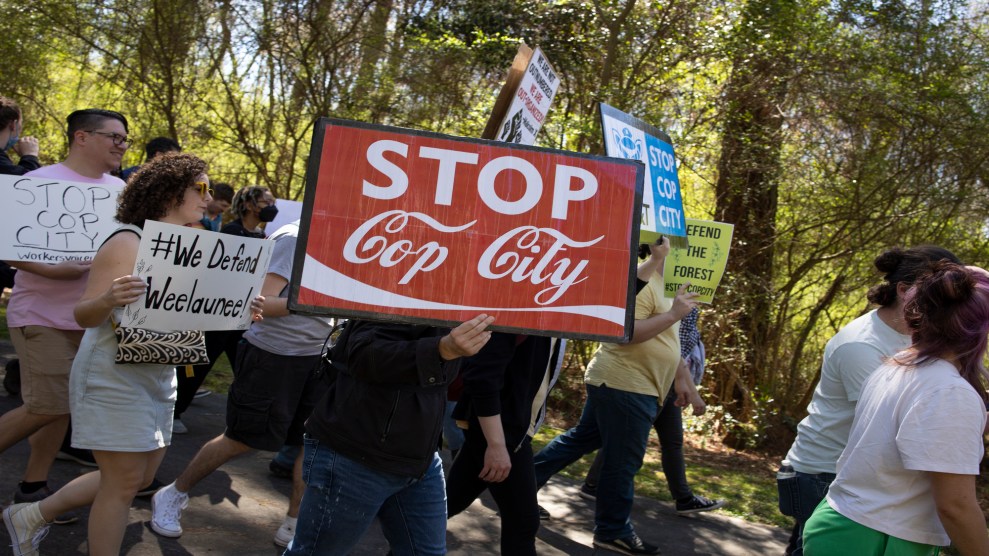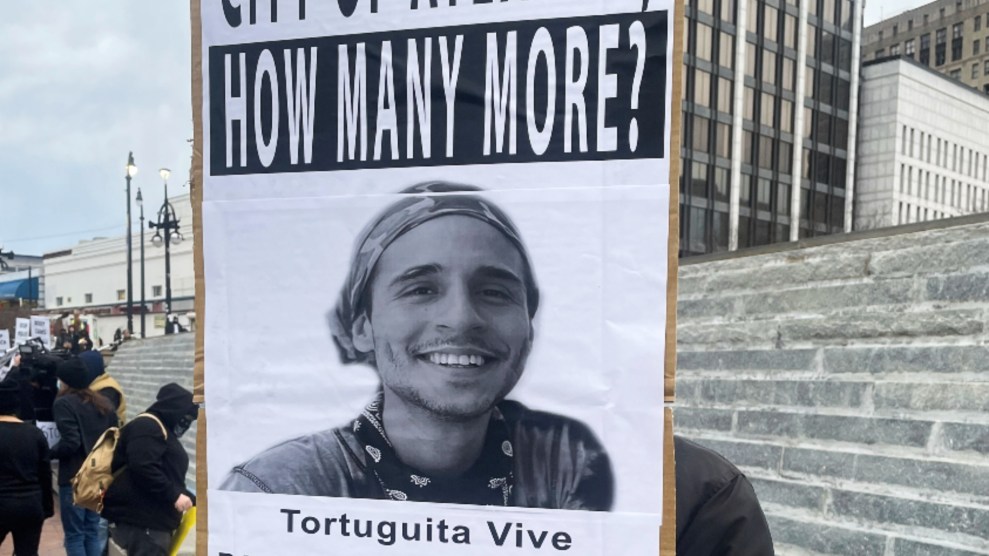
Environmental activists hold a rally and a march through the Atlanta Forest. Andrew Lichtenstein/Corbis/Getty
This story was originally published by Grist and is reproduced here as part of the Climate Desk collaboration.
Last summer, a “Chicago Against Cop City” Twitter account was created and began sharing information about a campaign unfolding some 700 miles away. Its first tweet, posted on July 18, promoted a talk at a community bookstore on Chicago’s west side featuring activists involved in the ongoing effort to protect a public park and forest in Atlanta. The speaking event—one of several the activists conducted across the country that year—was designed to raise awareness about the planned conversion of 85 acres of urban forest into a police training center that activists have dubbed Cop City.
It took less than two weeks for the FBI to flag the account, which was the focal point of a sprawling federal inquiry that collected information on several Chicago-based activist and community groups. Those groups appear to have done little more than promote or attend events affiliated with the Atlanta-area activists. According to 28 pages of FBI records obtained through a Freedom of Information Act request, the Chicago case file is part of a larger federal law enforcement assessment related to “Anarchist extremism” and domestic terrorism.
The documents describe members of the Atlanta group as “Anarchist Violent Extremists” and “Environmental Violent Extremists” who are “opposed to removal of trees and park land.” These activists traveled to Chicago, the FBI states, to meet with “like minded individuals” and “provide training.” There is little evidence in the nonredacted portion of the files or the public record to support the latter claim.
Promotional material for one of the events says it featured “action steps” to help participants find their “role in the struggle.” But one of the activists who traveled to Chicago—and who asked that their name not be used given the possibility of an ongoing FBI investigation—said the events were “informational slideshow presentations” that did not involve any kind of training.
“At no point in the presentations did we advocate for illegal activity,” they said. “And we certainly are not advocating violence.”
Grist and Type Investigations are publishing the full documents, which were redacted by the FBI before release, here and here. The contents of the files were first reported by Unicorn Riot, a nonprofit media organization.
Assessments are a relatively new category of FBI investigation, established under guidelines issued by the agency in 2008, that can be opened with little cause and allow for physical surveillance, database searches, and the use of informants to gather intelligence.
Since the FBI opened its file on Chicago Against Cop City, more than three dozen activists involved in the Atlanta protests and forest defense have been arrested and charged with felonies under Georgia’s 2017 domestic terrorism law. On January 18, a law enforcement officer shot and killed 26-year-old Manuel Esteban Paez Terán, a community medic who had been an active member of the campaign, during a raid on an encampment in the forest. Autopsy results recently released by the family revealed that Tortuigita, as Terán was known, was likely sitting on the ground with both arms raised when they were shot at least 13 times.
In public statements, the Georgia Bureau of Investigation maintains that Teran shot a state trooper first. However, the bureau has released only limited information, citing the ongoing investigation. Another autopsy carried out by the DeKalb County Medical Examiner’s Office has not been made public.
A Grist analysis of 20 of the early arrest warrants found that none of those charged with domestic terrorism were accused of seriously injuring anyone. Nine of the activists had simply been cited for misdemeanor trespassing, though the Georgia Bureau of Investigation has said that criminal inquiries are ongoing. The terrorism charges, according to the DeKalb County prosecutor, were based on a Department of Homeland Security designation of the Atlanta forest defenders as “Domestic Violent Extremists.” But Homeland Security, like the FBI, denies that it classifies specific groups in this way.
Mike German, a former FBI special agent and a fellow with the Brennan Center for Justice’s Liberty and National Security Program, said that while there’s nothing in the newly released FBI files to indicate that they’ve been shared with Georgia state authorities, the labeling of an entire group as violent extremists can shape the way law enforcement approaches social movements. “This exact kind of loose language may lead to the mistaken assumption that that categorization has some legal effect,” German said.
The FBI, which has a long history of targeting environmental activists, has been actively involved in the law enforcement response to the Atlanta forest defenders. According to a Georgia Bureau of Investigation press release, the FBI has been part of a joint task force intended to “eliminate the future Atlanta Public Safety Training Center of criminal activity.” In an April 2022 email, the Homeland Security Officer for the Atlanta Fire Department referred to FBI involvement in an “ongoing investigation” and described the activists as a group of “eco terrorists.”
The heavily redacted records on Chicago Against Cop City include social media posts by a broad range of social justice and environmental organizations. Rising Tide Chicago, a group called Save Jackson Park, the South Shore Nature Sanctuary, and Pilsen Community Books, a popular gathering place for local activists and the host of one of the events, are all named in the files. In one instance, the FBI refers to the use of a source with “direct and indirect access” to activists using the bookstore as a meeting place.
The records also highlight opposition to the construction of the Obama presidential library and the proposed expansion of a nearby golf course that would potentially require the removal of more than 2,000 trees. Save Jackson Park and the South Shore Nature Sanctuary have both campaigned to block the new golf course, which they say would destroy some of the only green space left on Chicago’s south side. The FBI concluded that the development projects in Chicago, along with the building of a police training center on the west side, were “similar” to the Atlanta construction project and could lead to “potential criminal activity.”
The FBI’s Chicago office declined to comment for this story.
A spokesperson for Rising Tide Chicago said that the bookstore event and a teach-in at Hyde Park three days later were intended simply to educate people about what was happening in Atlanta. “It was a speaking tour,” they said. “It wasn’t a direct-action training. The focus was about their struggle with Cop City.”
The spokesperson said that they don’t know who is behind the Chicago Against Cop City Twitter account, and that it doesn’t appear to be a formal group with an on-the-ground presence. It’s mostly served as a platform for sharing information about how people can support the movement in Atlanta from afar, they said. (Chicago Against Cop City did not respond to a direct message requesting comment.)
Jeanette Hoyt, a 65-year-old teacher at City Colleges of Chicago, is the founder of Save Jackson Park. She launched the group in 2020 to oppose the cutting down of nearly 400 trees and the destruction of parkland, including a beloved women’s garden, to make way for the Obama Presidential Center, which is still under construction. (According to the center’s website, the women’s garden will be “restored.”) One of Save Jackson Park’s social media posts was retweeted by Chicago Against Cop City—and that was enough to land the group in the FBI file. “The only connection between this group and Cop City is them liking me on Twitter,” said Hoyt.
The Rising Tide spokesperson is not surprised the FBI is keeping tabs on the group—it was formed in 2011 and has been named in other FBI investigations—but said it’s troubling that the agency would put together a dossier on organizations engaging in what are clearly constitutionally protected activities, such as attending public events and campaigning to stop controversial development projects.
“They are building evidence,” the Rising Tide spokesperson said. “And compiling social media posts for a narrative that they want to attach to the movement in Atlanta, and attach to people who are concerned about green spaces being taken away in Chicago and I’m sure other cities, too.”
German, who reviewed the documents, said the agency made several misleading connections between the various activist groups without providing evidence to back up serious claims of potential criminal activity and violent extremism among the Chicago groups. While participants in some of the Atlanta-area protests have thrown rocks, broken windows, and burned a police car, nobody connected with any of the Chicago groups or campaigns appears to have engaged in similar tactics. In addition, the police training academy in Chicago did not require the clearing of forested land and, despite local opposition, has already opened.
“Making this casual reference to an unrelated group 1,000 miles away is how the FBI gets itself in trouble,” said German, referring to a pattern of FBI overreach in targeting environmental groups. “I think the animus against the ideology is what’s most problematic.”
The law enforcement response to the campaign in Atlanta has, at least for now, galvanized interest in the protest movement. Following the shooting of Terán, there were marches and vigils across the country and around the world. Affinity groups have sprung up in Tucson, Arizona; Minneapolis; and Pittsburgh. Meanwhile, a growing number of environmental and human rights organizations have called on Georgia prosecutors to drop the domestic terrorism charges.
An Atlanta resident and active participant in the campaign who has been involved in other speaking tours—but requested anonymity due to ongoing police activity—said that the crackdown on the forest defenders has only served to broaden the movement’s public appeal. “The characterization of people as domestic terrorists—it’s really outraged a lot of people,” they said. “Lots of people are scared by that, but also more and more people are moved by the struggle and called to participate in it.”















